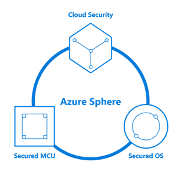| Microsoft Chooses Linux for IoT |
| Written by Kay Ewbank | |||
| Wednesday, 18 April 2018 | |||
|
Microsoft has chosen a Linux kernel for its latest move into IoT, despite the recent launch of Windows 10 IoT. Azure Sphere is the operating system that runs on micro controllers powering IoT devices. Azure Sphere consists of a set of technologies from processor to cloud connections for powering smart appliances, connected toys, and other gadgets. The reasoning behind the choice of Linux, according to Microsoft President Brad Smith, is that while Microsoft is best known as the Windows company, what is needed in microcontroller unit chips is something smaller. During a webcast announcing the new product, Smith held up a small IoT-optimized micro-controller unit (MCU) chip and said: "What we’ve recognized is, the best solution for a computer of this size—in a toy—is not a full-blown version of Windows. It is what we are creating here.” What was being announced consists of three parts. The hardware element is a new micro controller unit (MCU). Smith said the new class of MCUs has over five times the power of existing MCUs. The initial MCU is being made by Taiwanese manufacturer MediaTek, with other partners in the pipeline. The IP for the new MCUs is being issued royalty free to silicon manufacturers, according to Smith. The MCU comes with built-in hardware-based security in the form of private keys stored in a hardware-protected vault. The units will also have certificate-based authentication.Smith said "Azure Sphere will feature a turnkey cloud security service that guards every Azure Sphere device, including the ability to update and upgrade this security protection for a 10-year lifetime of the device. Importantly, Azure Sphere will work alongside any cloud – private or proprietary – so that customers can continue to use their existing data infrastructure while adopting Azure Sphere’s groundbreaking security for their devices." The MCUs will run Azure Sphere OS, and this is the element that caused the surprise. Smith described Azure Sphere OS as a customized operating system built for IoT security, "incorporating a custom Linux kernel that has been optimized for an IoT environment and reworked with security innovations pioneered in Windows to create a highly secured software environment." The Azure Sphere website says the operating system includes secured application containers that compartmentalize code for agility, robustness, and security; and a custom Linux kernel that 'enables silicon diversity and innovation'. Of course, Linux is already the main choice for embedded devices and what is emerging as the IoT, and whether Linux developers will want to tie themselves in to Microsoft via another route seems doubtful. One interesting question that this raises is what message the use of Linux sends out to those considering using Windows 10 IoT Core. If Microsoft itself sees Windows as too 'full-blown' for use on IoT devices, will anyone else consider using it?
More InformationRelated ArticlesLinux On Windows - Microsoft On How It Works Microsoft To Spend $5 Billion On IOT Windows 10 IoT Core - Raspberry Pi Home Automation Contest
To be informed about new articles on I Programmer, sign up for our weekly newsletter, subscribe to the RSS feed and follow us on Twitter, Facebook or Linkedin.
Comments
or email your comment to: comments@i-programmer.info |


